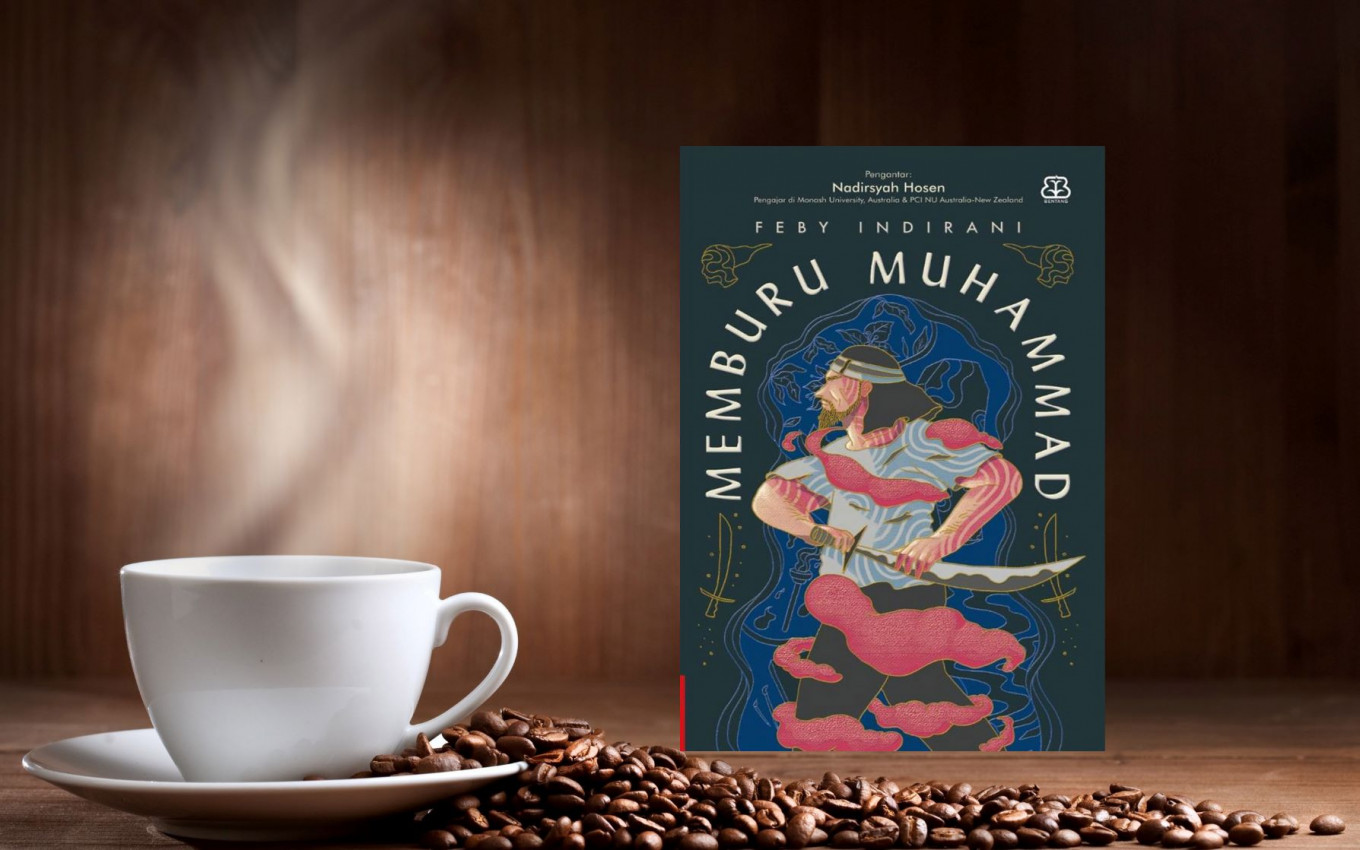Popular Reads
Top Results
Can't find what you're looking for?
View all search resultsPopular Reads
Top Results
Can't find what you're looking for?
View all search results‘Hunting for Muhammad’: Feby Indirani seeks to transcend political polarization in
Indonesian writer Feby Indirani attempts to go beyond ideological polarization by presenting the complex nuances of current sociopolitical lives through her work.
Change text size
Gift Premium Articles
to Anyone
F
eby Indirani has distinguished herself as an author who is capable of presenting the lives of Indonesian Muslims through an intimate and sympathetic eye.
Although her short stories, particularly the ones published in her debut anthology Bukan Perawan Maria (Not the Virgin Mary, 2017), also tackle the tricky issue of Islamic fundamentalism, she is able to capture the complex nuances of the Muslim fundamentalists' lives.
The stories in the first anthology consist of various tales, ranging from a woman who realizes she has lost her nose after wearing a niqab for quite a long time to a very devout Muslim who is shocked upon being questioned by angels in his native language instead of in Arabic.
Feby herself has branded her literary style as “magical Islamism”: an endeavor to capture the surreal and absurd in people’s everyday lives, tinged with fantasy, horror and comedy.
Her stories also counterbalance the stereotypical Western media portrayal of Indonesian Muslims, particularly the fundamentalists, as “extremists” or “radicals”.
It is encouraging that her first anthology has reached Western audiences through English, Dutch, Italian and German translations to present a different face of Indonesian Muslims.
Through her short stories, she is able to present these individuals as those who would sincerely like to practice their religious faith yet unfortunately get caught up in and confused by ruthless national political machineries.
One of the most captivating short stories in her latest work, Memburu Muhammad (Hunting for Muhammad), published in late 2020 by Bentang Pustaka, is called “Rahasia Rumah Kami” (Our Home’s Secret).
Highlighting the rupture between Indonesian liberals and conservatives during the 2019 presidential election, she astutely presents how both sides could be equally self-righteous and judgmental toward each other, being swept away by the political divisions encouraged by local politicians and public figures, amplified by the echo chambers of social media.
Feby said that during a global trend of ideological polarizations and cancel culture, all of which embodied black-and-white, all-or-nothing kinds of thinking, it was very important for concerned Indonesians to promote critical and logical thinking skills so that they would not become ideological extremists of any kind.
“I believe the prerequisite to critical thinking is the ability to think for yourself. Unfortunately, in Indonesia’s collective society, we’re not encouraged in our formal or informal education system to be independent thinkers,” she told The Jakarta Post in a zoom interview.
The author: Feby Indirani calls her literary style “magical Islamism”, an endeavor to capture the surreal and absurd elements in people’s everyday lives, tinged with fantasy, horror and comedy. (Courtesy of Feby Indirani/-)She then pointed out Indonesia’s feudal culture, in which children and students were prohibited from ever questioning their parents and teachers, as well as New Order-esque school subjects that promoted a rigid, single-minded mode of thinking.
“We have a subject called PPKn [Pancasila and Civic Education] whose exams contain multiple choice questions such as, ‘If you saw your friend fainting in front of you, what would you do?’ Students have begun to think that there’s only a single, normative answer to every question,” she said.
The New Order regime used Pancasila, or the official national ideology, as a propaganda tool to instill submission and obedience among Indonesian citizens.
“If you come from certain Muslim traditions, you’ll hesitate to think independently because you believe your thoughts can also count as a sin even if they exist only in your mind,” Feby said.
She became aware of this problem after noticing that some of her readers came to her to ask what was going on in her short stories because they did not have enough confidence in their own interpretations.
“I’ve always responded to these questions by asking them, ‘what do you think?’ So through my stories, I’d like to encourage people to have the confidence to think for themselves.”
Her magical Islamism style serves this mission well. In her second anthology, Feby stays true to a surreal and absurd interpretation of Indonesian Muslims’ everyday lives.
“Umi Shalihah Dimadu Lagi” (Mother Shalihah’s Husband Takes yet Another Wife), for instance, tells the story of a polygamous home in which mysterious, spontaneous combustion often occurs.
Another story, “Berebut Jenazah” (Fighting over a dead body) tells the tale of a Christian mother and a Muslim father fighting over whose traditions will be used to bury their deceased daughter. The story is told from the perspective of their daughter’s body.
Most of these stories are open-ended and ambiguous, allowing readers to decide for themselves what to make of the difficult issues of controversial religious practices such as polygamy and conflicts between Muslims and Christians, from the political down to the personal level.
By reading these stories, readers can also spark dialogue on these thorny subjects.
While speaking at the 2020 Jakarta International Literary Festival podcast in November of last year, Feby called on Indonesians to always communicate respectfully with people who had different views from them by taking into account each interlocutor’s blind, vulnerable and soft spots, accounting for different socioeconomic backgrounds and the bubbles in which people grew up and lived their lives.
Still, Feby’s short stories are distinguished by their incorporation of Indonesian Islamic lore.
For instance, people outside Indonesia’s Muslim community might find the story “Sebuah Eksperimen” (A Social Experiment), about a man who is tempted by a devious social experimenter to choose among drinking alcohol, having casual sex with a woman or killing a baby puzzling.
Feby said she was inspired by the recent deliberation of alcohol prohibition bill to write the story.
“The story might make no sense, yet any Muslim who has attended Islamic religious studies in primary school has already heard their teacher saying that drinking alcohol can lead you to commit escalated forms of evil, including having casual sex and killing a baby, countless times in their classrooms,” she said.
Meanwhile, “Siap, Pemain Pertama?” (Ready, Player One?) Incorporates elements of virtual reality games, depicting religious warfare through a game of chance.
Muslim scholar Ulil Abshar Abdalla has placed Feby’s work in the league of the great Sufi scholars, who often used rich humor, imagination and playful allusions in their writing, mentioning Persian poets such as the 13th century Fariduddin Attar, noting that such a literary tradition has long been present in the Muslim world.
Similar to Sufi intellectuals’ intoxication with rhymes, Feby is currently enthralled with poetry, reading the poems of Canadian author Margaret Atwood and American poet Sylvia Plath.
She said she would like to try her hand at poetry, something she has never done before. (ste)











